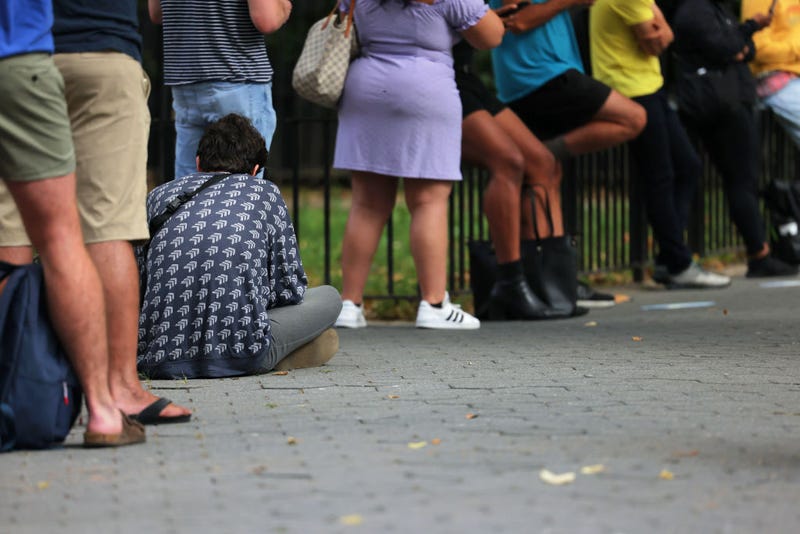
As more cases of monkeypox pop up in the U.S. some are finding it hard to get treatment, even though there are antiviral medications for the condition in the Strategic National Stockpile.
According to the U.S. Department of Health and Human Services, the U.S. Centers for Disease Control and Prevention “currently has an expanded access Investigational New Drug protocol,” allowing TPOXX, an antiviral treatment developed for smallpox, to be administered to patients with monkeypox. There are supplies of this drug in the stockpile.
Monekypox is an infection that is in the same family as the variola virus, which causes smallpox. Although cases are typically only found in certain regions of Africa, a global outbreak was identified this year by the World Health Organization.
As of the latest WHO update with data from June 22, there were more than 3,400 cases worldwide, including 793 in the U.K. and 142 in the U.S. By July 14, there were 1,856 laboratory confirmed cases in the U.K. alone and as of Monday, there were 1,972 in the U.S.
States with the highest number of cases include New York with 521, California with 267 and Illinois with 200. According to The Washington Post, Washington D.C. had the highest number of monkeypox cases per capita Monday at 122.
In late June, U.S. President Joe Biden announced an outbreak response plan for monkeypox that focused on vaccination and testing.
“The administration is grateful for the leadership and activism of advocates in the LGBTQI+ community who have thus far been most affected and have quickly mobilized to promote information and awareness,” said a fact sheet statement from the White House on the outbreak response.
In Philadelphia, the city’s Department of Public Health even retooled its COVID-19 call line to help people exposed to monkeypox get vaccinated, according to the Philadelphia Inquirer. Cases there nearly doubled from Friday to Monday, said the outlet.
According to the CDC, antivirals such as TPOXX may “be recommended for people who are more likely to get severely ill, like patients with weakened immune systems,” who already contracted the virus. TPOXX is the only specific antiviral mentioned by the CDC.
Before the CDC gave the green light for TPOXX use related to monkeypox, it became “the first drug approved by the U.S. Food and Drug Administration (FDA) that is specifically indicated for the treatment of smallpox disease in adults and pediatric patients weighing at least 13 kg,” said its manufacturer, SIGA.
“Though the World Health Organization declared smallpox, a contagious and sometimes fatal infectious disease, eradicated in 1980, there have been longstanding concerns that smallpox could be used as a bioweapon,” said the FDA when it approved TPOXX in 2018.
TPOXX works by preventing the formation of a “secondary viral envelope,” explained the company. Without this envelope, “viral particles remain inside the cell in which they are produced and cannot spread to and infect other cells.”
It is supplied in capsules containing 200 mg of tecovirimat, the medication’s active ingredient. Adults are instructed to take 600 mg twice daily for 14 days and to take doses after a high-fat meal.
“So I eat, like, a bagel with cream cheese or a McGriddle or something like that,” said Kyle Planck, who was quoted by NPR. “And then I take three of these pills with a full glass of water.”
Planck, a grad student in New York City studying infectious diseases, tested positive for monkeypox this month. He said that he believes that TPOXX has helped him recover faster.
However, Pien Huang of NPR reported Monday that advocates in the queer community have said few people actually have been prescribed the treatment.
“The federal government controls the supply, but officials with the CDC and the Department of Health and Human Services declined to tell NPR how much they’ve given out,” he said.
According to a Detroit Free Press report, of the 16 patients in Michigan wo had tested positive for COVID-19 as of Monday, only one has received TPOXX.
The CDC updated information about obtaining the medication last week. Dr. Mary Foote, medical director of the office of emergency preparedness and response for the New York City Department of Health and Mental Hygiene, said that the process includes around 120 pages of paperwork and can take hours to complete.
“In a busy community clinic, urgent care, emergency department, where most of these patients are being seen, this is nearly impossible to implement,” she said.
Dr. Russ Lampen, an infectious disease specialist at Spectrum Health West Michigan, said that treatment antivirals could be unnecessary in the majority of monkeypox cases, since they are mild. Yet, Foote said even mild cases could be debilitating.
“Monkeypox is the worst pain I’ve had in my life,” Planck said. “And especially because it was, like, an internal sort of pain, it was very – really hard to deal with.”
According to Dr. Lilian Abbo, a professor of clinical infectious diseases at the University of Miami Miller School of Medicine and a member of the board of directors for the Infectious Disease Society of America, testing for monkeypox can also be a struggle. One reason is that the rash caused by the virus can be confused with sexually transmitted diseases. Another is getting approval from public health labs.
“We have seen patients that have been going up to seven centers – three different urgent cares, dermatologists and ERs – to try to figure out what's going on,” Abbo said. “By the time they arrive, some of them may have been healed or some of them may have progression of disease.”
Despite these challenges, the CDC encourages anyone who believes they may have monkeypox to contact their health care provider.


